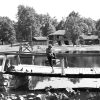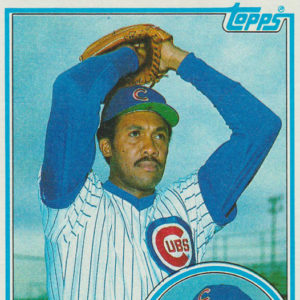calsfoundation@cals.org
Ferguson Arthur (Fergie) Jenkins (1942–)
Fergie Jenkins was a major league pitcher in the 1960s, 1970s, and early 1980s. Over his nineteen-year major league career, the six-foot-five-inch right-hander established a reputation for consistency and durability. Jenkins pitched for the Arkansas Travelers in 1963, 1964, and 1965, and was only the second African American to play for the Travelers. He won a Cy Young Award in 1971 and was inducted into the Baseball Hall of Fame in 1991.
Ferguson Arthur (Fergie) Jenkins Jr. was born on December 13, 1942 (although some records say 1943, Jenkins has always maintained that it was 1942) in Chatham, Ontario, Canada. He was the only child of Ferguson Arthur Jenkins Sr. and Delores Jenkins. Growing up in Chatham, Jenkins was a talented and versatile star athlete, lettering in track, hockey, and basketball at Chatham Vocational High School. Jenkins never wholly abandoned his other athletic pursuits, playing for the Harlem Globetrotters on a number of occasions during the baseball off-season.
Jenkins signed with the Philadelphia Phillies organization in 1962 and was initially assigned to the AAA Buffalo Bisons of the International League. Jenkins spent part of three seasons—1963, 1964, and 1965—in Arkansas pitching for the AAA Arkansas Travelers, before finally reaching the major leagues for good in 1966.
He was only the second black player for the Travelers. He played only four games for the Travelers in 1963, one of which he started, and totaled only ten innings. He was then sent down to the Class A Miami Marlins in the Florida League. (His absence likely made life harder for the Travelers’ first African-American player, Dick Allen, who was then left to endure the stress of integrating the Travelers alone.) In 1964, he started the year in Arkansas and appeared in eleven games, starting in nine of them. He compiled a record of 5–5 before he was sent down to the AA Chattanooga Lookouts, where he spent most of the season. He started the 1965 campaign with the Phillies, but after only seven appearances, he was sent down to the Travelers, where he compiled a record of 8–6 with an ERA of 2.95 in 122 innings. He also recorded 112 strikeouts. That performance was enough to warrant a spot in the majors, although the Phillies traded Jenkins to the Chicago Cubs on April 21, 1966.
In 1965, Jenkins married Anne Katherine (Kathy) Silas. They had three daughters and divorced in 1986.
Appearing in sixty games in 1966, twelve of which he started, he compiled a 6–8 record with an ERA of 3.31 in 182 innings pitched. The following year, he hit his stride, recording the first of six straight twenty-win seasons. From 1967 to 1972, Jenkins won at least twenty games, while also striking out at least 200 batters each season. He averaged 314 innings pitched over that six-year span, the most dominant period in the nineteen-year career in which he pitched for four different teams—the Philadelphia Phillies, the Chicago Cubs, the Texas Rangers, and the Boston Red Sox, with two stints with both the Cubs and Rangers. Over the course of those nineteen seasons, he was three times selected for the All-Star team, and he won the National League Cy Young Award in 1971.
Jenkins led the National League in complete games four times. He also was the National League leader in starts on three occasions and victories twice. He is also one of only four major league pitchers to record more than 3,000 strikeouts while issuing fewer than 1,000 walks. He led the National League in fewest walks per nine innings five times, and he was also the leader in strikeout-to-walk ratio five times. Overall, he achieved 284 wins against 226 losses, pitched 49 shutouts, and compiled 3,192 strike-outs, finishing with a career ERA of 3.34. Jenkins was the first member of the Chicago Cubs, as well as the first Canadian, to win the Cy Young Award. In the 1967 All-Star Game, he struck out American League All-Stars Harmon Killebrew, Tony Conigliaro, Mickey Mantle, Jim Fregosi, Rod Carew, and Tony Oliva. He was inducted into the Baseball Hall of Fame in 1991.
Following his retirement as a player, he began working as a pitching coach at the minor league level, while also engaging in charitable work, especially in support of his Fergie Jenkins Foundation, an organization that supports hundreds of charities across the United States and Canada.
For all his baseball success, Jenkins has had a troubled personal life. In 1980, toward the end of his playing career, Jenkins—who has expressed regrets about engaging in occasional drug use—was arrested when cocaine was found in his luggage during a road trip to Toronto, Canada. He was adamant in his claims of innocence, and while he was found guilty, the judge gave him an absolute discharge, which ultimately cleared his record. Major League Baseball, however, suspended him for twenty games, fined him $10,000, and ordered him to take part in the organization’s drug education program.
In 1988, Jenkins married Mary-Anne Miller; he adopted her son, and their daughter was born the following year. Mary-Anne died in January 1991, just days after he had been elected to the Hall of Fame, from injuries suffered weeks before in an automobile accident. Then, in the fall of 1992, his fiancée committed suicide in an incident that also took the life of his three-year-old daughter; both victims died of carbon monoxide poisoning. In 1993, Jenkins married Lydia Farrington, with whom he lives in his native Ontario, where he devotes considerable time and energy to the Fergie Jenkins Foundation.
For additional information:
Jenkins, Fergie, with Lew Freedman. My Life from the Cubs to Cooperstown. Chicago: Triumph Books, 2009.
Thomson, Cindy. “Fergie Jenkins.” SABR BioProject. https://sabr.org/bioproj/person/7b2f6e52 (accessed April 23, 2019).
Turcotte, Dorothy. The Game Is Easy, Life Is Hard: The Story of Ferguson Jenkins Jr. St. Catharine’s, Ontario, Canada: The Fergie Jenkins Foundation, 2002.
Whitford, David. “Glory amid Grief.” Sports Illustrated, July 15, 1991. Online at https://www.si.com/vault/1991/07/15/124536/glory-amid-grief-battered-but-unbowed-by-family-tragedy-ferguson-jenkins-looks-toward-his-induction-into-the-hall-of-fame (accessed April 23, 2019).
William H. Pruden III
Ravenscroft School
 Divergent Prosperity and the Arc of Reform, 1968–2022
Divergent Prosperity and the Arc of Reform, 1968–2022 Recreation and Sports
Recreation and Sports Fergie Jenkins
Fergie Jenkins 




Comments
No comments on this entry yet.